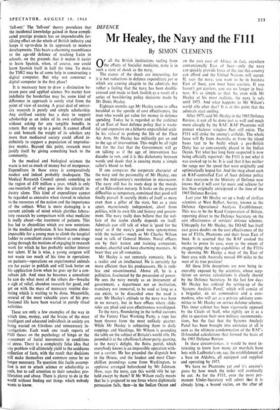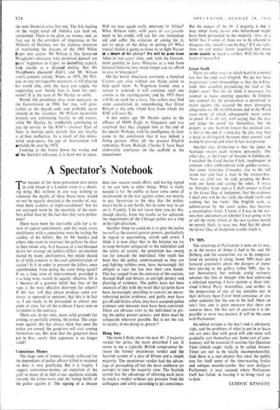Mr Healey, the Navy and the F111
DEFENCE By SIMON CLEMENTS OF all the British institutions reeling from the effects of Socialist medicine, none is in such a state of shock as the navy.
The causes of the shock are interesting, for it is not reductions in defence expenditure per se which are causing chagrin to the admirals, but rather a feeling that the navy has been double- crossed and made to look foolish as a result of a series of bewildering policy decisions made by Mr Denis Healey.
Eighteen months ago Mr Healey came to office heralded as the apostle of cost effectiveness, the man who would get value for money in defence spending. Today he is regarded as the architect of an East of Suez defence policy that is waste- ful and expensive on a hitherto unparalleled scale.
In his refusal to prolong the life of the Fleet Air Arm, Mr Healey has militarily put an end to the age of intervention. This might be all right but for the fact that the Government will go on talking as if the age of intervention has decades to run, and it is this dichotomy between words and deeds that is causing many a simple sailor's blood to boil.
If one compares the corporate character of the navy and the personality of Mr Healey, one sees the mid-century's revolution in microcosm.
The navy still has its roots deep in the morals of an Edwardian nursery. It looks on the present difficulties as temporary, convinced that good will finally prevail. It secretly thinks of itself as more even than a pillar of the state, but as a state apart, mysteriously independent, aloof from politics, with its own life and history and govern- ment. The navy really does believe that the wel- fare of the realm chiefly depends on itself.
Admirals can still talk of what is 'good for the navy' as if the navy's good were synonymous with the nation's—much as Mr Charles Wilson used to talk of General Motors. Naval officers are by their nature and training competent, modest, cheerful and have charming manners. At heart they are all romantics.
Mr Healey is not remotely romantic. He is a realist and an intellectual. He is certainly far more efficient than his predecessors. He is ruth- less and unsentimental. Above all, he is a politician, fascinated by the possession of power.
He sees the navy merely as an instrument of government, a department not an institution, transitory not immortal, to be used as long as a use exists, to be discarded once the need is over. Mr Healey's attitude to the navy was born in no nursery, but in bare offices where slide- rules are plied and cost effectiveness worshipped.
To the navy, floundering in the turbid currents of the Future Fleet Working Party, a rope has been thrown from the most unlikely quarter.
While Mr Healey is subjecting them to daily cuppings and bleedings, Mr Wilson is pounding the table on the subject of Britain's world role. He pounded it at the rebellious Labour party, quoting, to the navy's delight, the Beira patrol, which everybody knows is an impossible operation with- out a carrier. He has pounded the dispatch box in the House, and the loudest and most Chur- chillian poundings came from Washington, to
applause arranged beforehand by Mr Johnson. How, says the navy, can this world Nile be up-
held except by them? If Mr Wilson really means that he is prepared to use force where diplomatic persuasion fails, then—in the Indian Ocean and on the east coat of Africa; in fact, anywhere conventionally East of Suez—only the navy can quickly provide force of the size this country can afford and the United Nations will accept. If, says the navy, you want to be in business East of Suez, you must have carriers. If you haven't got carriers, you are no longer in busi- ness. It's as simple as that. So, even with Mr Healey at his most realistic, the navy is safe until 1975. And what happens to Mr Wilson's world role after that? It is at this point that the admirals start smiling.
After 1975, said Mr Healey in the 1965 Defence Review, it can all be done just as well and much more cheaply by the RAF. RAF Phantoms will protect whatever wingless fleet still exists. The F111 will strike the enemy's airfields. The whole force will fly from Australia or from the island bases (yet to be built) which a pro-British Deity has so conveniently placed in the Indian Ocean. Yet what has long been suspected is now being officially reported: the F111 is not what it was cooked up to be. It is said that it has neither the range nor the speed that were originally and optimistically hoped for. And the snag about such an RAF-controlled East of Suez defence policy is that everyone in the Ministry of Defence now knows that it will cost far more and achieve far less than originally anticipated at the time of the 1965 Defence Review.
Last year Mr Healey set up a body of civilian scientists at West Byfleet, Surrey, known as the Defence Operational Analysis Establishment. This was to be the Rand Corporation of Britain, reporting direct to the Defence Secretary on the cost effectiveness of services' defence schemes. Unhappily for Mr Healey, the DOAE has itself cast grave doubts on the cost effectiveness of the use of Fl 1 Is, Phantoms and their bases East of Suez. It is asserted that the RAF cooked the books to prove its case, even to the extent of exaggerating the range capabilities of the Fl 1 Is by showing Mr Healey a map of the East of Suez area with Australia moved 400 miles to the west of its true position!
All these little deceptions are now being in- exorably exposed by the scientists, whose scep- ticism on service calculations is clearly shared by the Defence Secretary. In the last few days Mr Healey has ordered the setting-up of the `Systems Analysis Panel,' which will consist of a brigadier, an air commodore and a com- modore, who will act as a private advisory com- mittee to Mr Healey on service defence schemes. This inner cabinet has been vigorously opposed by the Chiefs of Staff, who rightly see it as a plot to question their own military recommenda- tions, but the fact that the Systems Analysis Panel has been brought into existence at all is seen as the ultimate condemnation of the RAF's ill-founded calculations that formed the basis of the 1965 Defence Review.
In these circumstances, it would be most in- teresting to know how many air marshals have bets with Ladbroke's on, say, the establishment of a base on Aldabra, all equipped and supplied and operating by 1975.
We have no Phantoms yet and it's anyone's guess by how much the order will eventually be cut. As for the F111, even the most per- manent Under-Secretary will admit that it is already lying, a bound victim, on the altar of
the next financial crisis but one. The fish feeding on the virgin coral off Aldabra can feed on, unalarmed. There is no plan, no money and, so they say in the corridors of impotence in the Ministry of Defence, not the slightest intention of translating the dreams of the 1965 White raper into action. Mr Wilson is like Somerset Maugham's character who promised himself ten years' happiness in Capri on dwindling capital, with suicide as a planned ending. But Mr Maugham's character didn't, and Mr Wilson won't, commit suicide. When, in 1975, Mr Wil- son, or any envisageable successor, is still playing his world role, only the navy can supply the supporting cast. Surely here is food for opti- mism? It is the turn of Mr Healey to smile.
World role poundings may seem necessary to the Government in 1966, but they will grow fainter as the decade ends and probably cease entirely in the 'seventies. Mr Wilson meanwhile protests our continuing loyalty to old causes, while Mr Healey, by stubbornly continuing to pay lip service to the RAF's takeover East of Suez, is making quite certain that our loyalty is at best ineffective. As a result of this minis- terial soap-opera, the age of intervention will certainly be over by 1975.
Looking at the future down the wrong end of the Socialist telescope, it is hard not to agree.
Will we ever again really intervene in Africa? What African ruler, with years of seir-govern- ment to his credit, will ask for our immediate aid and suffer the criticism of asking for it, not to speak of the delay in getting it? What trucial sheikh is going to force us to fight Nasser in a desert of his choice? We will be gone from Aden in two years',time, and, with the Govern- ment panting to leave Malaysia at a nod from General Suharto, how much longer can we afford to stay in Singapore?
On the South American continent, a hundred Castros can arise without our being asked to help quell them. As Napoleon found, once a retreat is ordered, it will continue until one arrives at the starting-point; and by 1975 there will be no need for a navy. The sailors may find some consolation in remembering that Great Britain is the only island base from which the RAF will ever fly.
A few weeks ago Mr Healey spoke to the officers of HMS Eagle in Singapore and was surprised that they clapped him at the end of his speech. Perhaps, with his intelligence, he later came to the conclusion that it was indeed a fitting gesture. After all, the greatest English romantics, Essex, Raleigh, Charles I, have been elaborately courteous on the scaffold to the executioner.































 Previous page
Previous page